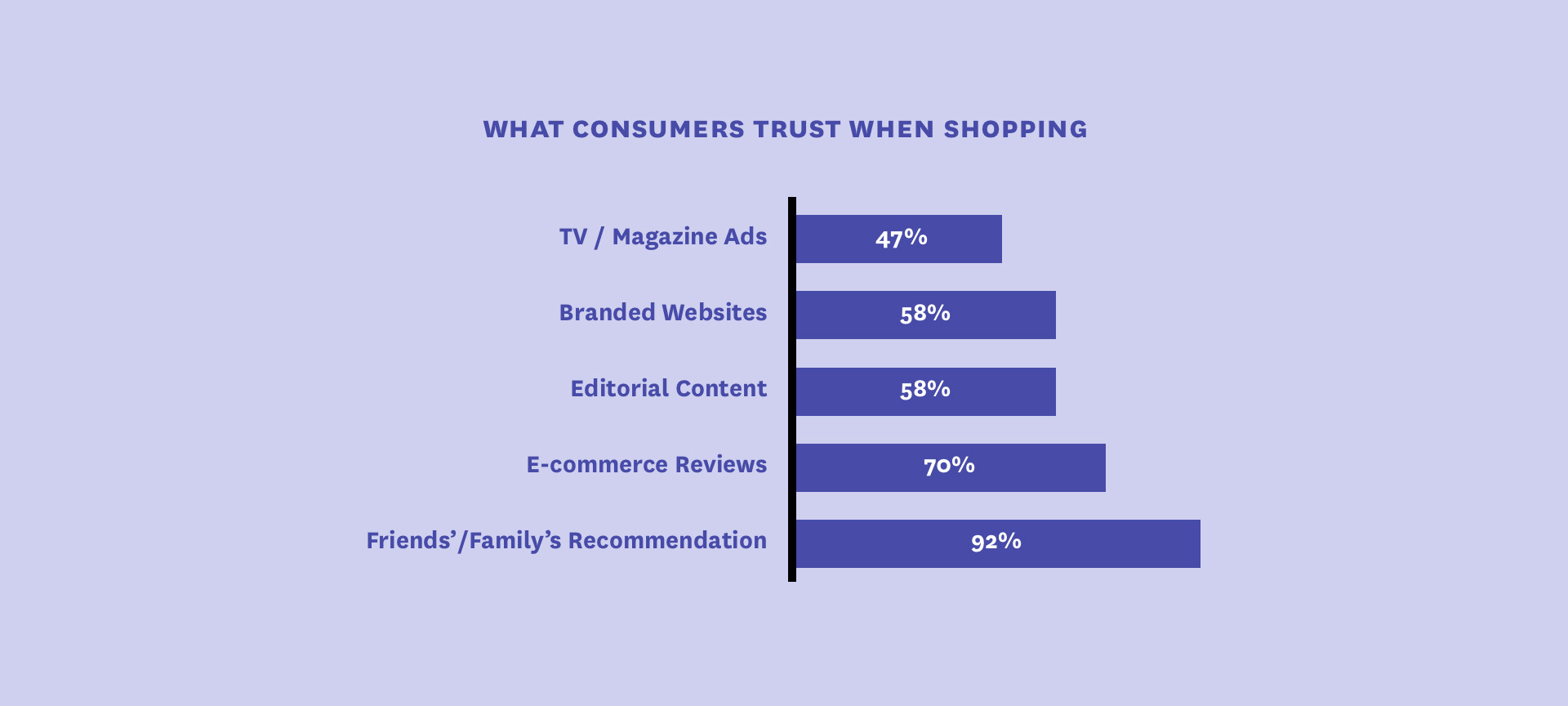Table Of Content
%20(3).png)
People don’t trust you. Hearing that sounds harsh, but if you’re running an online store, it’s the truth: customers don’t trust what you say.
It doesn’t matter how reputable your business is, people will be naturally skeptical of everything you say about your products and services. Especially in your marketing.
But customers trust each other. Over 90% of people say they trust product recommendations from their peers over marketing.
Savvy marketers have long realized this and have used this fact effectively in their campaigns to increase sales. That’s what social proof is: letting your loyal customers do the talking for you.
That’s why we’ve created this post to look at what social proof is and how you can best utilize it to maximize sales.
The different types of social proof
We’ve already touched on what social proof is: it’s recognizing people will trust your actual customers and what they do and say more than they’ll ever trust your own marketing.
But there’s a lot of different ways you can do this. Including:
User-generated content (UGC)
User-generated content is just what it says on the box - content that users (in other words, customers) create themselves. A common example is when someone takes a photo or selfie of them wearing or using your products and then shares this on social media.
While they might not be explicitly reviewing or saying how much they like your product, it’s powerful evidence that people are actually buying and enjoying what you sell. This a classic case of a picture being worth a thousand words.
We’ve explored UGC more in our blog post here.
Expert recommendations
Peers are not the only people customers trust more than brands when it comes to making purchases. A recommendation or endorsement from a recognized and trusted expert in your field can be extremely powerful for your marketing.
Although experts represent a special kind of customer, their endorsement in whatever form it takes still falls under the umbrella of social proof.
Using influencers to endorse your products
Influencers are another kind of unique customer where their endorsement carries more weight compared to regular joes.
We’ll explore influencer marketing and how it relates to social proof later in this post, but the key feature of a good influencer is having followers on social media that align with your target customer.
If you want to explore this area in more depth, check out our guide on selling products on Instagram with influencers.
Highlighting engagement you already have on social media
Speaking of social media, chances are you already have your own following and engagement. This can be a rich source of social proof for your brand.
Simply just highlighting how many followers you have on various platforms and then linking to them helps show you’re a legitimate brand that people actually like.
If you want to take it up a notch, you could incorporate your social feeds into your own site.
Building trust with certifications
Similar to expert endorsements, certifications can be another powerful form of social proof.
One way of looking at it is that a single certification is really an entire group of experts endorsing your product.
Creative ways to use social proof in your marketing strategy
1) Highlight product ratings and reviews
Product reviews and ratings are the original form of social proof and arguably one of the most effective. They’re also something customers expect to find.
More than 90% of customers read online reviews before deciding whether to purchase a product.
So it doesn’t matter if you’re highlighting positive reviews or not, your customers are looking for them regardless. So you may as well make their job easier and ensure they’re coming across the best ones.
Obviously, the first step to doing this is collecting customer reviews to showcase. You can do this in a few ways such as sending customers a review request email after they purchase a product.
Once you start accumulating reviews, make sure you display them prominently on your product pages. This is where they’ll have the greatest impact while customers are actively considering whether to add a product to their cart.
While many ecommerce sites do this well, a particularly good example is Sephora.
They place the average rating right underneath the product name. It even takes precedence over the price!
In addition to the overall average, Sephora also shows how many people rated the product. This can help highlight particularly popular products and reassures people there’s more than just one reviewer.
Clicking on this section takes you further down the product page where individual reviews are listed.
Having this level of detail available right on the product page is a great way to satisfy even the most inquisitive of customers and make the most of the power social proof offers.
Fomo makes it easy to add social proof like this on your product pages (and throughout the rest of your site for that matter).
With our app, you can showcase product reviews from sites such as Yotpo, Judge.me and Google Reviews with popups. You can also show off other social proof trust signals including recent purchases, email signups and new social media followers.
Fybr used these tools to boost new user acquisition by a whopping 70% on their Shopify store.
2) Don’t limit yourself to just your own site
Showcasing positive reviews on your site can dramatically increase your conversion rates, but it’s not the only place customers look for reviews.
There are plenty of third-party review sites out there and everyone has their favorites. Which ones are most relevant for your brand will depend on your industry. For example, Yelp is particularly popular with restaurants but caters to all kinds of businesses.
One incredibly important review platform all brands should pay attention to is Google. Being the world’s largest search engine means Google reviews are highly visible to plenty of potential customers.
The caveat here is that you have less control over reviews that appear on these platforms compared with your own site. But you can mitigate this by knowing how to publicly respond to reviews.
3) Utilize influencer marketing
Influencer marketing has been a key strategy for many ecommerce brands for a while. Notable examples include Casper, Warby Parker and Allbirds.
However, with consumers’ trust in influencers waning, the key to leveraging influencers well is authenticity and matching the influencers you work with to your target audience.
Some consumer bases will respond well to celebrity endorsements. Others will respond better to micro-influencers who they trust more.
Fashion Nova is an excellent example of an ecommerce brand that’s partnered with a whole range of influencers effectively. From celebrities including Kylie Jenner.
To micro-influencers with more niche social followings that Fashion Nova has identified are made up of their target customers.
Fashion Nova even has a public form on their website inviting new influencers to collaborate with them.
Obviously, most brands don’t have the budget to work with top-tier celebrities.
However, if you think carefully about your target market, search for profiles with followings that match and reach out. Not only will it promote your products to their followers, but you have the potential to re-use the content on your own site.
4) Showcase endorsements from trusted sources
Customer reviews are not the only form of social proof you should be including on your site.
We’ve already mentioned that expert endorsements and certifications from reputable authorities make for powerful social proof. So if you have any of these, be sure to leverage them on your product and landing pages.
Casper does this well.
They don’t jump up and down screaming about their certifications, but subtly add them as a watermark in their product images to ensure they’re seen by customers.
Of course, product pages are not the only place you should include this.
Casper also has dedicated pages to showcase their awards as well as mentions in the press.
Linking to these pages in your footer (like Casper does) and from your About page means people researching your brand will come across them. These people are looking for social proof like this to guide their decision, so make sure you provide them with it.
5) Work in social proof into your email marketing
Social proof and email are two highly effective marketing tools, but many marketers only consider them in isolation and not together.
The fact is, when you combine them together they play off each other’s strengths and become quite potent.
One place social proof works great in your email campaigns is with your abandoned cart series.
Cart abandoners are often people right on the edge of becoming customers. So including product reviews or other trust signals in your abandoned cart email can give them that extra ‘push’ they need to convert.
Adidas does this well in their email.
Abandoned cart emails aren’t the only spot you can include social proof. Your welcome series, winback campaign and browse abandonment emails all offer prime real estate for social proof as well.
6) Include social proof in your ads
Why stop at incorporating social proof into your email marketing?
If you’re running ads, whether that’s on social media, banner ads, or any other kind of advertising (including old-school print ads), you should seriously consider including social proof in them.
A good example of this in action is Tentree’s Facebook and Instagram ad below. Not only have they included a positive customer review but have also worked in a couple of certifications to reinforce their messaging.
This isn’t the only type of social proof you could be including though. You could also leverage user-generated content and repurpose content influencers created (such as by boosting or re-sharing their posts).
You can even use your paid social media marketing to generate UGC which can then be used as social proof later on.
Wrapping up
Customers will always be naturally skeptical of anything you say.
But by implementing social proof through your site and marketing in the ways we’ve explored, you don’t need them to take your word for it. You’ll be letting your most valuable customers do the talking for you.
Done well, your social proof will boost your conversion rate and directly lead to more sales.
Looking for an easy way to quickly add social proof to your online store? Learn more about all the features we at Fomo (the world’s first social proof marketing platform) offer merchants.




 1.svg)
 1.svg)


